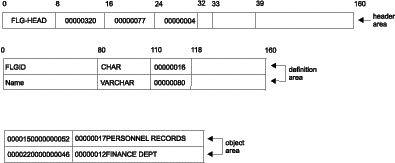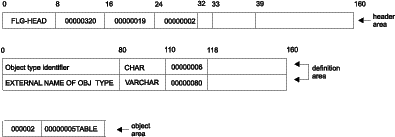
Retrieves a list of object instances or object types in which a specified instance is found. FLGFoundIn can retrieve any of the following:
Authorization
Administrator or user
Syntax
APIRET APIENTRY FLGFoundIn( PSZ pszFLGID,
FLGOPTIONS Options,
PFLGHEADERAREA * ppListStruct,
PFLGEXTCODE pExtCode );
Parameters
Characters 1-6 of this ID identify the object type of this instance.
Characters 7-16 of this ID are the system-generated unique instance identifier.
The FLGID you specify depends on what you want to list:
For each Contain, Contact, or Attachment relationship, the output structure contains the following information about the "found-in" object instances:
All instances are sorted by object type name first, then object instance name, in ascending order according to collating order of the underlying database management system.
For each Program association, the output structure contains the following information about the "found-in" object types:
All object types are sorted by the 80-character external name of object type (EXTERNAL NAME OF OBJ TYPE) in ascending order according to collating order of the underlying database management system.
The maximum number of object instances or object types that can be returned by FLGFoundInis 5000.
See Appendix D, Information Catalog Manager reason codes for an explanation of the returned reason codes.
Usage
Freeing memory allocated for an output structure
If FLGFoundIn returned data in the output structure, you must save the data returned in the output structure and then call FLGFreeMem (see FLGFreeMem). Do not use other methods, for example, C language instructions, to free memory.
This sample code retrieves a list of object instances in which the specified Contact object is found. Figure 68 shows the C language code required to issue the FLGFoundIn call.
Figure 68. Sample C language call to FLGFoundIn
APIRET rc; // reason code from FLGFoundIn
UCHAR pszInstID[FLG_ID_LEN + 1];
FLGOPTIONS Option=0; // association type
PFLGHEADERAREA * ppReturnObjList; // pointer to output structure ptr
FLGEXTCODE xc=0; // extended code
.
. /* provide values for input parameters */
.
Option = Option | FLG_LIST_CONTACT;
rc = FLGFoundIn (pszInstID,
Option,
ppReturnObjList,
&xc);
Figure 69 shows the output structure for the FLGFoundIn call.
Figure 69. Sample output structure for FLGFoundIn

This sample code retrieves a list of object types handled by the specified Programs object instance. Figure 70 shows the C language code required to issue the FLGFoundIn call.
Figure 70. Sample C language call to FLGFoundIn
APIRET rc; // reason code from FLGFoundIn
UCHAR pszInstID[FLG_ID_LEN + 1];
FLGOPTIONS Option=0; // association type
PFLGHEADERAREA * ppReturnObjList; // pointer to output structure ptr
FLGEXTCODE xc=0; // extended code
.
. /* provide values for input parameters */
.
Option = Option | FLG_LIST_PROGRAM;
rc = FLGFoundIn (pszInstID,
Option,
ppReturnObjList,
&xc);
Figure 71 shows the output structure for the FLGFoundIn call.
Figure 71. Sample output structure for FLGFoundIn
